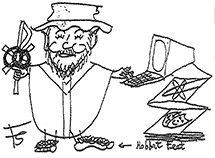I started life with affectionate parents: one liked to talk science and history, the other gave me prayer, religion, and art appreciation. So when in mid-life I chose to research science in its relation to theology, I already was experienced in religious practice and attention. I brought this over to my study of science, which for me detailed the many things I could find to thank God about.
I remember many times when I thought I would bargain with God: if only He would help me get through some situation, I would attend to Him in one way or another. Just recently two people came to me whose approach was much like this: “I made a bargain with God,” said one, “and It worked.” She did not say what her side of the bargain was. The other person was in continuing difficulty, and she was asking God: How long?
The Bible has many references to bargains, or covenants made with God. Except that the prophets usually speak from God’s side, and they say what God is offering. In the story of Noah, God is offering not to destroy humankind again, and the sign of the covenant is the rainbow. Many asked, and still do, about God’s role in natural disasters. Most of the discussion today, however, is about humanity’s responsibility for natural disasters.
And Abraham and God made a covenant to make his descendants holy: the sign was circumcision. God, they said, made a further series of signs of covenanted favour to the children of Israel: the burning bush, the manna in the wilderness, the rock gushing with water, the conquest of Jericho.
The sacrificial tradition, which had openly veered away from human sacrifice when God kept Abraham from killing his son, continued in the temple as animal and offerings sacrifice. When a great disastrous captivity of the people led to the destruction of the temple, God spoke words which said that his people would know him through their hearts, and Scripture is a record of constant efforts to turn the hearts of those who stray.
I now ask: what in science corresponds to covenants?
Covenants are partnerships: One party of the first part promises: in exchange, the party of the second part promises. The two-way relationship has a certain balance to maintain.
How about equations? “If this, then - that.” My science dictionary lists Maxwell’s equations, which describe electromagnetism:
Unlike charges attract; like charges repel.
North poles need south poles, and vice versa.
Electrical currents - magnetic fields.
Magnetic fields - electrical currents.
Covenants between God and people would seem to have a basic inequality; but there are several statements of relationship which have covenantal aspects, balancing and relating persons to persons, or persons to God:
Giving and Receiving.
Forgiving and Being Forgiven.
Thanks and Grace.
Power and Authority.
Exchange and Substitution.
Loss and Renewal.
These are Equations of Love.

